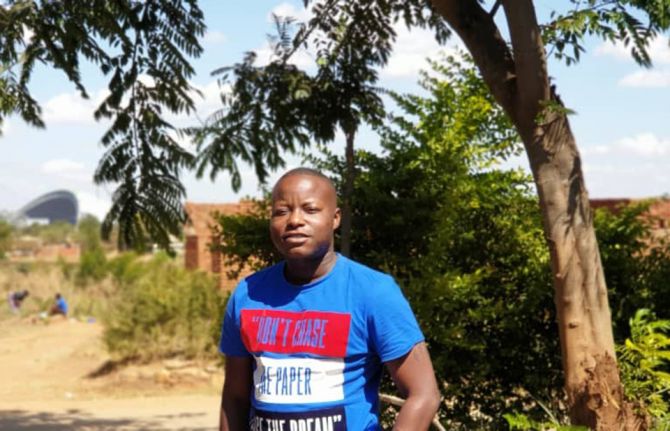

Feature Story
Changing the lives of transgender people in Malawi
03 June 2019
03 June 2019 03 June 2019Lesbian, Intersex, Transgender and other Extensions (LITE) started out in 2016 as a support group for lesbian, gay, bisexual, transgender and intersex (LGBTI) people in Lilongwe, Malawi. “There was so much commonality in the challenges facing lesbian, gay, bisexual, transgender and intersex people that this motivated me to form a nongovernmental organization addressing these issues,” says Lawrence Phiri Chipili, Executive Director of LITE, who is a transgender man.
Since its formation in 2016 and its formal registration in 2017, LITE has navigated its way into important national platforms, including the Malawi National AIDS Commission’s technical working group that guides the multisectoral AIDS response.
In May 2019, LITE, along with five other LGBTI organizations in Malawi, formed the Diversity Forum to collaborate on their common goal of ensuring that LGBTI rights are promoted, protected and respected in Malawi. LITE is also the Deputy Chair of the Southern Africa Trans Forum, which brings together 18 transgender organizations from the Southern African Development Community. In 2019, LITE and Mr Chipili were recognized by the Human Rights Campaign as one of their global innovators.
None of this recognition has come easy to the organization. Using his academic background in economics, Mr Chipili has pushed for evidence to support the organization’s advocacy.
“We decided as we were forming the organization that we needed a baseline understanding of what the needs of transgender people are in both the rural and urban areas of Malawi,” he says. “We didn’t want to base our assumptions on a small group of people living in Lilongwe. We conducted a needs assessment with communities and we realized the overarching challenges they have in accessing health-care services, education, employment, legal services and the enjoyment of safety and security.”
The research has helped the organization to design its advocacy strategy, which involves rendering transgender people’s issues visible in the public and policy space.
The organization also uses policy and the law to shape its advocacy. In 2015, the Malawian Government accepted that LGBTI people should have access to health and security. However, according to Mr Chipili, these recommendations are not implemented on the ground. Thus, using these recommendations as a basis, LITE designs its strategy to generate research so that it can strategically engage with the government.
No one knows more about these challenges better than Mr Chipili. He has been thrown out of home, school and university. His resilience and determination seem only to have grown stronger from his experiences.
“I risk my life; I risk the lives of people in my immediate circles, but these are problems that we experience in our everyday lives so we must speak about them. Hate speech towards my community pains my soul but it motivates me because people don’t understand the impact of their words. My mission is to work hand in hand with these people and help them to understand,” he says.
Mr Chipili acknowledges that while it has been a lone struggle by the LGBTI community to become more visible, the role of partners, including UNAIDS, has been critical. “UNAIDS has assisted us in understanding where our gaps are in our organizational policies and helping us to shape the direction in which we should go,” he says. “It has advocated for our inclusion in national platforms and helped us to strategically engage with the government, with the ethos of leaving no one behind firmly at the centre.”
The work has just started for Mr Chipili and his organization. “We need more technical support, human resources and financial resources. One of the major issues is transgender programming and funding globally is limited. A lot of resources are given to organizations that work with men who have sex with men and female sex workers,” he says. “Transgender people are usually invisible, yet we are the people who are experiencing so much hate and stigma, making us even more at risk of HIV infection,” he says.
Related information
Region/country
Related
 “Who will protect our young people?”
“Who will protect our young people?”

02 June 2025
 Impact of US funding cuts on HIV programmes in Malawi
Impact of US funding cuts on HIV programmes in Malawi

15 April 2025

